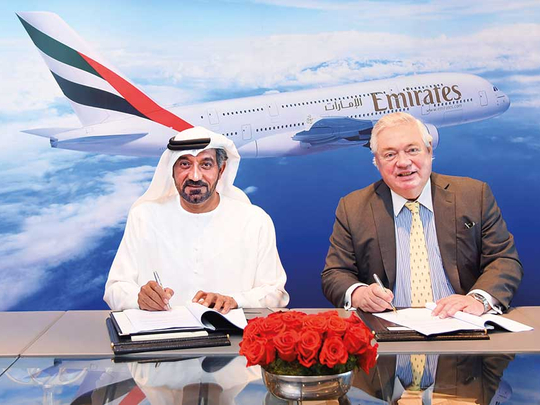
Dubai: Airbus said on Thursday that it is committed to producing its A380 aircraft for “at least another 10 years” after it signed a $16-billion (Dh58.7 billion) programme-saving deal with Emirates airline.
John Leahy, chief operating officer at Airbus commercial aircraft, said in a statement that he believed the A380 model will continue to be produced beyond 2030.
The A380 model has not had orders in over two years.
The deal was an order from Emirates for 36 new Airbus A380s, set to be delivered from 2020 onwards. The order follows months of negotiations, including talks during the Dubai Air Show in November during which both sides failed to reach a deal.
“This aircraft has contributed enormously to Emirates’ growth and success since 2008 … This new order underscores Airbus’ commitment to produce the A380 at least for another 10 years,” Leahy said.
“I’m personally convinced more orders will follow Emirates’ example and that this great aircraft will be built well into the 2030s,” the veteran sales chief added.
The commitment to keep the A380 programme alive comes just days after Airbus said it would have to stop producing the aircraft model if it does not work out a deal with Emirates, the aircraft’s main customer.
Just as recently as Monday, Leahy said that Airbus was still talking to Emirates, and that he was hopeful a deal will be worked out. Leahy said Emirates was “probably the only one with the ability right now in the market place to take a minimum of six [A380s] a year for a period of eight to 10 years.”
Emirates had been demanding more assurance from Airbus on the future of the A380 programme.
Tim Clark, president of Emirates airline, told Reuters in November that the carrier needs guarantees that if it does buy more A380s, “the line will be continued for a minimum period of years and that they are fully aware of the consequences of cancellation and leaving us high and dry.”
But analysts said that Airbus will have to get more than just the latest order from Emirates to secure the A380’s future.
John Strickland, director of air transport consultancy JLS Consulting, said the order from the Dubai-based carrier also underlines the importance of the A380 to Emirates’ strategy.
“Equally, it will be a relief to Airbus to secure this order and to provide certainty. Orders need to be secured from other airlines too, and work is required to invest in improving the aircraft’s payload and efficiency as part of this process,” he said.
For Emirates, the new A380s will help the carrier expand into new markets and serve more passengers as well as replace older aircraft.
Andrew Charlton, managing director of Geneva-based Aviation Advocacy, said the A380s will allow the carrier to bolster its network, though new route opportunities are more limited.
“My view is that the impact is much more important for Airbus than for Emirates. The 36 aircraft will, to a large extent, be replacement aircraft as the fleet rotates and older aircraft are retired. This is not to downplay Emirates’ growth plans because it is clear that they have a lot of expansion in prospect,” he said.












